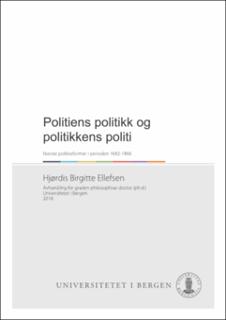| dc.description.abstract | What is ‘police’? Or rather, what was ‘police’ before it became the institution and body of uniformed officers patrolling public places and investigating crime, that we perceive it as today? How and why did ‘police’ become that way? Norwegian police history has mainly been researched from a legal or institutional point of view. This thesis explores the formation of ‘police’ as a socio-political concept by analysing Norwegian police reforms in the time period 1682-1866. During this stretch of time the Norwegian state was transformed from an absolutist monarchy ruled by the sovereign in Copenhagen, into a constitutional monarchy based on liberal and democratic principles and the Rule of Law. This study aims to understand what role ‘police’ played in this governmental transformation, and by this contribute to our knowledge about the history of police and politics. Building on the theoretical framework of Reinhard Koselleck, Quentin Skinner and Michel Foucault, police is studied as a historical concept, as a political intention, and as an expression of governmentality. The source material consists of laws and regulations, governmental documents, reports, propositions, newspapers, pamphlets and letters, and it has been analysed with the intention of finding the answers to three research questions: What was police, who wanted police, and why? The result is a history of how and why the politics of police (politien) was transformed into the police of politics (politiet), and how this transformation was interlinked with the establishment of a modern liberal-democratic state based on the principle of Rule of Law. During the absolutist era (1660-1814) police was established as a way of governing and promoting the general welfare of the state, through administrative regulations, officials and courts. Police was a result of the absolute rulers’ intention of enhancing their control over the economic, social and moral life of the cities, legitimized in what Foucault denotes as raison d’Ètat. But, as this study shows, it was also a result of the initiative of the bourgeoisie who saw police as an instrument for the protection of their commercial priveleges. In the late 1600s and early 1700s police was formed in a negotiation between the sovereign and the bourgeoisie, but when the sovereign issued police ordinances for the Norwegian cities (1710-1745) the bourrgoisie’s influence was impaired. As a consequence of the Kiel treaty granting Norway to Sweden after the loss of the Napoleonic war in 1814, a revolutionary assembly argued that the contract between sovereign and people had ceased to exist, and a Norwegian constitution was drafted and declared. During the period of 1814-1866 Norwegian police was transformed into a, partly state and partly municipal, bureaucratic institution, consisting of a hierarchy of uniformed officers who were patrolling the streets and investigating crime. What, during the absolutist era, was police as a way of governing to promote the order and welfare of the state, was transformed into police as an instrument for the prevention and repression of disorder and crime. Previous research refers to the establishment of London Metropolitan police in 1829, and the import of this police model in Stockholm (1850), Christiania (1859) and Copenhagen (1863), as the turning point in the transformation from the “old” to the “new” police. By studying how police was discussed in parliament and newspapers in the four decades preceding the establishment of a patrolling constabulary in Christiania in 1859, this study shows that the the transformation from the “old” to the “new” police was a result of a political process that started long before 1859. By illuminating how political concepts like freedom, sovereignty, power, protection and welfare were comprehended and discussed in debates about police, the thesis provides new insight into the history of politics. It shows that ‘police’ was a key concept in the political formation of a modern state based on liberal and democratic principles and the Rule of Law. And, it explains how and why we ended up with a police legitimized in an amalgamation of absolutist, bureaucratic, democratic, republican and liberalist ideals. | en_US |
